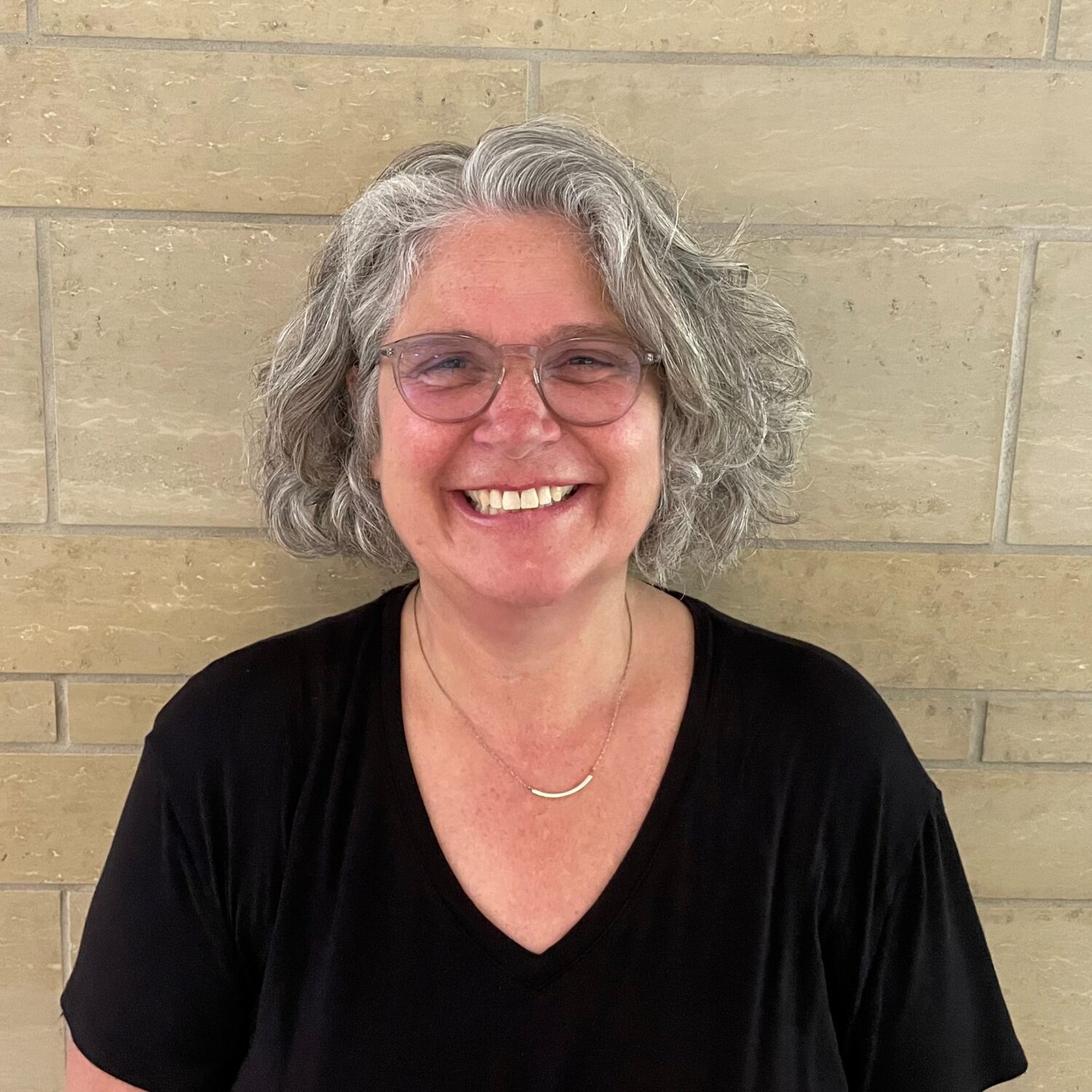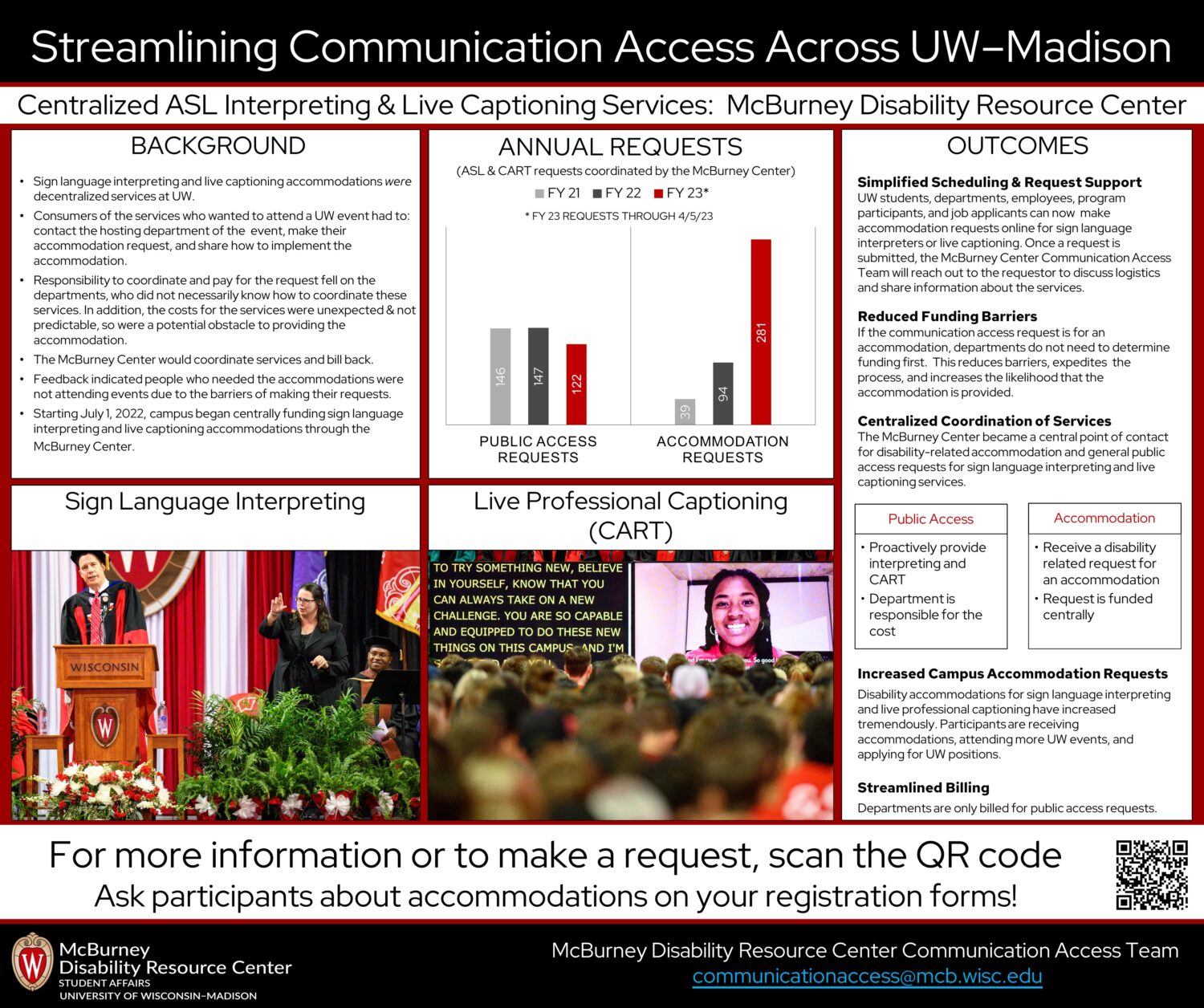For many students, attending college is a time of personal growth and enrichment as they explore potential career paths, build connections, and participate in life-changing opportunities through university-sponsored programs. Results from the 2022-2023 DPAIS revealed that 33% of deaf college students are not likely to participate in student activities at their college or university. Accessibility challenges make deaf students less likely to connect with their peers or participate in campus events.
Many college operations are not set up with streamlined processes for accommodation expenses. Often they are operating on a ‘decentralized’ system. A decentralized system is where departments or organizations have various ranges of autonomy and decision making as it relates to funding and coordinating access services. This can create barriers that can impact deaf students’ engagement in campus activities. In contrast, a centralized funding system provides colleges a clear process with coordinating accommodations across campus that allows for greater access and belonging for deaf students.
Exploring the Benefits of a Centralized System
Funding structures can have a significant impact on how accommodations are secured, coordinated, and implemented. The differences between common systems to coordinate access can be found below.
Decentralized System(s) | Centralized System(s) | Hybrid System(s) | |
|---|---|---|---|
Description | Departments are responsible for funding and coordinating accommodations for their events and activities. | Access services are coordinated through a single office and they have the capacity to hold a campus-wide budget with allocations determined by an administrative funding source designated to cover all accommodation costs. | Individual departments fund services and coordinate with a designated department. |
Advantages & Challenges | Individual departments may be unaware of their obligations to coordinate and fund access when an accommodation request is made. Therefore, costs of services are not planned or included in their budget projections. Departments would need additional training to be aware of theirADA or Section 504 obligations. | Departments coordinating accommodations do not bear the sole responsibility for funding. The staff also have expertise in the coordination and delivery of accommodations. | As departments may be unaware of their obligations to collaboratively provide access, there needs to be a clearly communicated campus policy and process to ensure that students, staff, and departments understand their roles when coordinating accommodations. |
There are often delays in the efficiency and delivery of sign language, speech-to-text (STT), and captioned media services when there are several people involved in the logistics of the accommodations process when using a decentralized or hybrid approach. The cumulative impact of these delays on student access was the driving force behind the University of Wisconsin-Madison’s decision to adopt a centralized funding system last year.
Centralizing Systems to Benefit Students On Campus
As the state’s flagship university, UW-Madison realized there was more they could do to create opportunities for deaf students to participate in campus events and activities. In 2019, UW-Madison’s McBurney Disability Resource Center submitted a proposal for centralized funding to campus administrators which was then approved by the administration in 2021. NDC met with the McBurney Center Director, Mari Magler, and Assistant Director, Terri Oehrlein, to learn more about how they successfully convinced administrators to adopt a centralized system and the impact of its inaugural year with centralized funding had on deaf students, staff, and campus visitors.
For years, UW-Madison operated on a hybrid approach to funding where departments were responsible for funding accommodations outside of the classroom, but worked with the McBurney Center for services coordination. However, the McBurney staff found that departments often struggled with accommodation requests for campus events because they were infrequent and unanticipated, causing a lack of preparedness and budgeting concerns. These concerns had a significant impact on the turnaround time in coordinating for accommodations.
The McBurney staff developed a centralized funding proposal for campus administrators, highlighting the inefficiencies of the process as a contributing barrier to deaf student success on campus. The proposal included data collected over four years highlighting the number of requests from deaf students and those costs. The central administration budget could cover deficits caused by funding for accommodations, but departments faced barriers demonstrating the need for the funding. Therefore, it made sense for McBurney to propose the central administration budget to be included in their purview for the centralized funding approach along with their expertise with the delivery of accommodations.
While the proposal incorporated internal data specific to the university, Mari also reported that the approval of the proposal was in part successful due to relationships with university leadership, specifically within Student Affairs and Finance & Administration. By connecting with the administration, this partnership helped to solidify the outcome of the proposal as a means of supporting overall student engagement and belonging at UW.
Implementation Process
UW-Madison’s centralized funding system went into effect in July 2022 and covered all accommodation requests for deaf students, staff, applicants, and campus visitors for university-sponsored programs and activities beyond the classroom. As McBurney updated relevant campus webpages with the new request process and communicated the changes to previous departments that experienced accommodation requests, the news quickly spread through word of mouth. McBurney reports that in the first year of the initiative, the number requests for sign language interpreting and CART services for university events substantially increased, shattering any misconceptions that the impact of centralized funding would be minimal. The high number of requests tells a powerful story in how simplifying the request process has the potential to increase student and community engagement for a marginalized population.
The new process for requesting accommodations starts with the deaf person contacting the McBurney Center to submit their accommodation request using an online form. The McBurney Center staff then coordinates the services and works collaboratively with the department regarding event logistics (prep materials, technology access, access recommendations, etc.) to ensure that access goes smoothly. The additional requests from the centralized funding system also provide consistent work for the Center’s hourly staff interpreters and CART providers. The volume and the type of requests serve as an incentive for service providers to accept future work with UW-Madison.
Currently, the centralized funding system only covers sign language interpreting and CART services for university-sponsored activities. If a department wanted to proactively provide accommodations for public access reasons (without a specific request from a deaf person), they would still be responsible for funding services from their budgets. However, the university proactively provides public access without an accommodation request for sign language interpreting and CART services for many of its ‘signature events’ such as commencement, convocation, and the keynote for its campus-wide reading program due to previous collaborative work between the campus and the McBurney Center. McBurney Center staff also anticipate that the centralized funding system may help identify more opportunities for collaboration to provide proactive access to other wide-scale public events.
When a graduating deaf student learned of the implementation of the centralized funding system at UW-Madison after their departure in 2022, they shared that this process would have been a game-changer for their overall student experience and could have impacted their connection to others on campus.

Mari Magler, J.D.
Mari Magler, J.D., is the director of the McBurney Disability Resource Center at UW–Madison. She has worked in the field of disability and disability advocacy since 1994 and in higher education since 2005. Magler is passionate about disability justice, access, and advocacy. She earned her Juris Doctor from Hamline University School of Law, and her bachelor’s in linguistics from Metropolitan State University. She co-authored “The Mentor’s Companion: A Practical Guide to Mentoring” and “A Plan for Mentorship of Educational Interpreters in Minnesota.”

Terri Oehrlein
Terri Oehrlein, Assistant Director of McBurney Disability Resource Center Deaf & Hard of Hearing Services at UW-Madison. She has worked as a sign language interpreter for over 30 years. Terri moved into administrative work in DHH services in higher education in 2007. Terri received her Bachelor of Science in Rehabilitation Psychology from UW-Madison and completed her interpreter training at UW-Milwaukee.
Centralized Funding Systems as a Best Practice
Centralized funding systems promote access for the whole institution. A major advantage of a centralized system is that a single entity already has the knowledge and expertise in accommodation delivery can work quickly and efficiently to ensure access happens. This process centers the deaf student and allows for delivering quality, efficient services. A centralized system also provides many advantages for the campus as a whole; it streamlines procedures and policies while also ensuring cost-savings in both services provided and human resources.
Changing Your Systems: A Call to Action
Centralizing funding streams takes collective action. Here are a few tips to get started:
Connect
Explore existing systems with centralized funding practices. Connect with colleagues or other institutions and inquire about their practices, experiences, and lessons learned.
Commit
Commit to conversations and relationship building with administrators. Propose and discuss streamlined processes that emphasize student-centered practices within campus operations.
Collect
Collect data to demonstrate needs and barriers exist on your campus. Use the data as evidence to strengthen proposed changes and benefits for students, departments, and the institution as a whole.
Contribute
Engage students, explore how students can contribute to system-wide changes and use their lived experience to reflect the impact of decentralized systems.
For more information about centralized funding, NDC recommends the following resources:
- Centralized Systems that Promote #DeafSuccess at Colleges is a collaborative presentation between NDC and the National Association of the Deaf (NAD) to help higher education professionals learn more about practices to improve campus-wide access for deaf students by modeling a centralized system approach.
- Improving Campus Access is a facilitated course that provides basic knowledge and the tools necessary to understand the complexities of providing access to deaf students pursuing postsecondary education.










